The daily ritual of brewing coffee, enjoyed by millions, often overlooks the environmental impact of coffee filters. Traditional filters, while convenient, can contribute to environmental waste and pollution. It has led to a growing interest in eco-friendly alternatives that are not only better for the planet but also enhance the coffee brewing experience.
From paper to cloth, and metal to unconventional materials, the range of eco-friendly coffee filters available today offers a sustainable solution for every coffee enthusiast.
Read on to learn all about eco-friendly coffee filters and if they can help you make a positive impact on the environment.
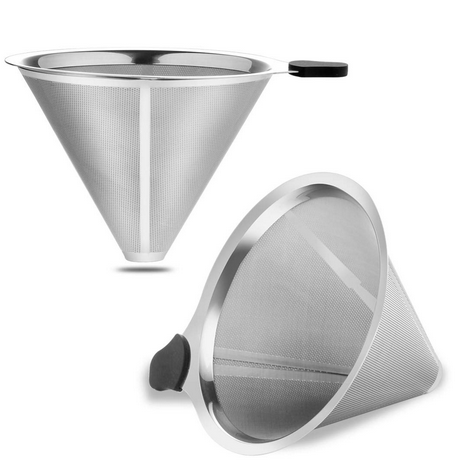
Types of Coffee Filters And Their Environmental Impact
There are a few two main types of coffee filter, disposable and reusable and we will look at each of these in turn and assess their environmental impact:
Paper Coffee Filters
Paper coffee filters are the most common type, known for their convenience and ability to produce a clean cup of coffee.
However, their environmental impact is significant, especially when they are not biodegradable or compostable. The production process of paper filters often involves bleaching and the use of chemicals, which can be harmful to the environment.
Reusable Filters
Reusable filters, such as those made from cloth or metal, are excellent eco-friendly alternatives.
- Cloth Filters are typically made from natural fibers like cotton or hemp. They are known for their ability to filter out sediment while allowing some of the coffee oils to pass through, offering a balance between a metal filter and a paper filter in terms of flavor. Cloth filters require thorough cleaning and need to be dried properly to prevent mold and off-flavors.
- Stainless Steel Filters, often made from stainless steel, metal coffee filters are durable and can last for many years. They usually have fine mesh designs, which allow more of the coffee oils and a fuller-bodied coffee to pass through. They’re easy to clean and are often used in pour-over, drip, and AeroPress coffee makers.
- Gold-Plated: Some high-end filters are made from gold-plated stainless steel. The gold plating is non-reactive and doesn’t impart any metallic taste, ensuring the pure flavor of the coffee. These filters are also durable and easy to clean.
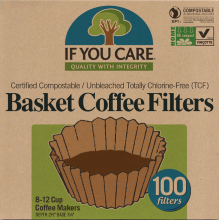
The Eco-Friendly Edge: What Makes a Filter Sustainable
A coffee filter can be considered sustainable based on several key factors which we will now consider:
Material
Sustainable coffee filters are typically made from materials that are either biodegradable, compostable, or highly durable for long-term use.
Materials like organic cotton, hemp, and metal (especially stainless steel) as we mentioned in the previous section are popular sustainable choices. They should be free from harmful chemicals and produced in an environmentally friendly manner.
Reusability
One of the most significant aspects of a sustainable coffee filter is its reusability. Reusable filters can last for many years, reducing the need for disposable, single-use filters. This longevity significantly reduces waste and resource consumption.
Manufacturing Process
The sustainability of a coffee filter also depends on how it is produced. Filters made using eco-friendly manufacturing processes, which minimize water usage, carbon footprint, and pollution, are more sustainable.
Biodegradability and Compostability
If a filter is single-use, such as paper filters, it should be biodegradable. It ensures that, after its short lifespan, it can break down naturally over time without harming the environment. Ideally, these should be unbleached or processed without chlorine to prevent the release of harmful chemicals.
Packaging
Sustainable coffee filters are often packaged in recyclable or biodegradable materials, reducing the impact of packaging waste.
Ethical Sourcing
The raw materials for the filters should be ethically sourced, ensuring that their production does not exploit labor or harm the environment.
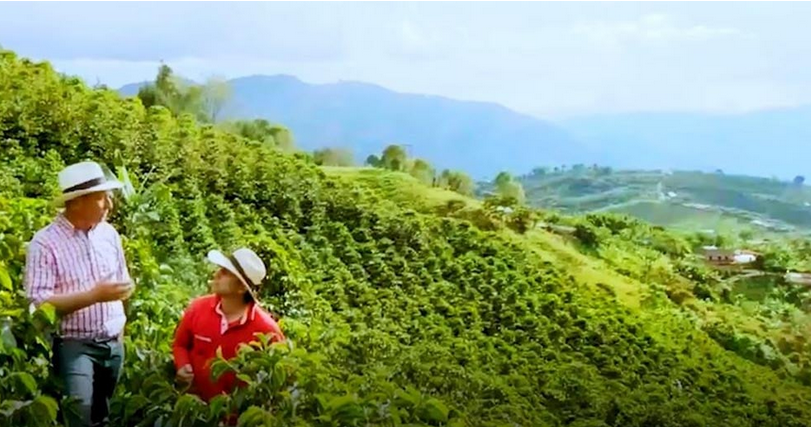
Alternative Coffee Filter Options
By thinking outside the box, there are a number of alternative coffee filter options that do not fit into the standard reusable filter.
- Paper Towels and Napkins as Temporary Solutions: In a pinch, paper towels and napkins can serve as temporary coffee filter substitutes. While not ideal, they are readily available and can mimic the functionality of standard coffee filters. However, it’s important to choose unscented and chemical-free options to avoid altering the coffee’s taste.
- Cotton cloth, such as a clean dish towel or cheesecloth, offers a reusable and eco-friendly alternative to traditional filters. This method not only reduces waste but also allows for customization in terms of coffee strength and flavor.
- Using a cotton sock as a coffee filter is an unconventional yet effective method. This approach is particularly useful in emergency situations or for those seeking a zero-waste option.
Alternative Coffee Brewing Methods Without Filters
There are several well-known coffee brewing methods that do not need filters at all, or they can be used with filterless options. We will now look at each one in turn.
French Press: A Classic Choice
The French press is a beloved method for brewing coffee without the need for filters. It involves steeping coarse coffee grounds in hot water and then pressing them down to separate the grounds from the brewed coffee.
AeroPress: For a Quick and Rich Brew
The AeroPress is a modern alternative that combines immersion and pressure to brew coffee. It’s a quick, efficient, and filterless method that produces a rich and smooth cup of coffee.
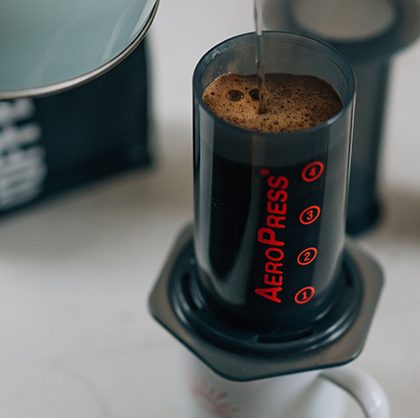
Percolators: The Old-School Approach
Percolators brew coffee by cycling boiling water through coffee grounds using gravity. This method doesn’t require filters and is great for making large quantities of coffee.
Pour Over Techniques: Precision and Control
Pour over methods, such as the Chemex or V60, offer a hands-on brewing experience. While they typically use filters, filterless options are available, allowing for precise control over the brewing process and a full-flavored cup of coffee.
Reusing and Repurposing Used Coffee Filters
Beyond their primary use in brewing coffee, used coffee filters have a variety of applications that can contribute to a more sustainable lifestyle.
Gardening Uses: Composting and Plant Care
Used coffee filters are excellent for gardening. They can be composted along with coffee grounds, enriching the soil with nutrients. Additionally, placing them at the bottom of plant pots can prevent soil from escaping during watering, while still allowing water to drain properly.
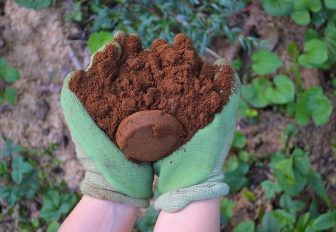
Cleaning Applications: From Polishing to Wax Removal
The soft and lint-free nature of coffee filters makes them ideal for cleaning tasks. They can be used to polish glassware, clean windows, and even remove excess wax or oil from surfaces.
DIY Sachets and Cold Compresses
You can create DIY sachets by filling dried, used filters with herbs or essential oils. These sachets can freshen up drawers or repel insects. Additionally, coffee filters can be used to make cold compresses, providing a mess-free solution for minor injuries.
Tips for Choosing the Ideal Coffee Filter
Selecting the right coffee filter can significantly impact your coffee experience, both in terms of taste and environmental impact.
Compatibility with Coffee Makers
Ensure the filter you choose is compatible with your coffee maker. Different brewing methods require different types of filters, such as cone-shaped for pour-over or flat-bottom for drip machines.
Flavor Preferences and Filter Types
Consider how different filters affect the taste of your coffee. Paper filters typically result in a cleaner cup with less oil, while metal or cloth filters allow more oils through, creating a richer flavor.
Environmental Considerations
For those looking to reduce their environmental footprint, reusable filters like cloth or metal are preferable. If you opt for paper filters, look for biodegradable or compostable options.
Maintenance and Cleaning Requirements
Reusable filters require regular cleaning to maintain their effectiveness and prevent flavor tainting. Paper filters offer convenience as they are disposable, but they contribute to waste.
Conclusion
Eco-friendly coffee filters offer a sustainable alternative to traditional coffee brewing methods, reducing waste and often enhancing the flavor of the coffee. From reusable cloth and metal filters to innovative uses for used filters, there are numerous ways to make your coffee routine more environmentally friendly. Embracing these alternatives not only contributes to a healthier planet but also adds a unique touch to your daily coffee ritual.
FAQs
Addressing some common queries can help clarify misconceptions and provide useful insights into eco-friendly coffee brewing.
Do different coffee filters affect the taste of coffee?
Absolutely. The type of filter used can influence the amount of oils and fine coffee particles that end up in your cup, thus altering the flavor profile.

Written by Robbie – Coffee Writer and Researcher at MyCoffeeBeanz.com
Robbie has over 15 years of extensive experience working in the coffee industry in marketing. As a native New Yorker he loves the hustle and bustle of a big city and enjoys nothing more than breaking up his busy day with trips to the nearest coffee shop for a double espresso. Find out more about Robbie
